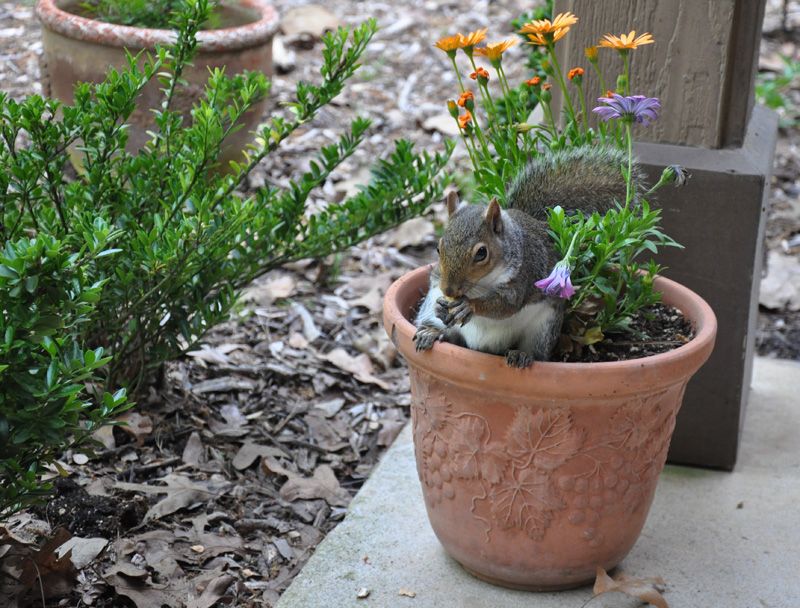
Squirrel
Squirrel
From the outside, squirrels appear as cute little rodents, hopping around the garden and occasionally nibbling on nuts. However, only gardeners know the real struggle behind keeping their crops safe from them, so these mischievous pests do not destroy the entire backyard. Most people think squirrels only rely on nuts. Unfortunately, that is not the case! These critters have a knack for almost all kinds of food, ranging from flowers and seedlings to fresh fruits and vegetables. If you see a half-nibbled tomato, shallow digging spots in the flowerbeds, or bite marks on your produce, these pesky creatures have likely seen the way to your garden.
They come out in great numbers during late summer and fall to prepare for the winter by storing food. The most common species of squirrels in North America are the Sciurus carolinensis, usually called gray squirrels. With a characteristic gray, bushy tail used for communication, warmth, and stability, these little troublemakers can easily be identified. To help you picture them better, their tails are as long as their bodies. They also have large hind limbs that allow flexible mobility.
Read on to learn more about what attracts squirrels to your garden and some practical tips on how to keep them away.
What attracts them to the garden?
Considering the huge population of squirrels in North America, it is impossible to stop their entry in your gardens. Hence, you need to play smart and know what attracts them, so you can get rid of them strategically.
Food stations
The foremost reason why squirrels and other garden critters come to your garden is food. Of course, there is no better place to find food than lush, green gardens; featuring a number of trees and providing a full buffet to these animals. You are likely to see more squirrel invasions if you have nut-bearing trees in your garden.
Water sources
Besides food, another crucial aspect when it comes to wildlife is access to drinking water. Hence, gardens with birdbaths, fountains, pools, and water reservoirs experience a greater influx of garden critters.
Branching trees
Trees, especially those with long branches are important for squirrels for nesting as well as hiding from their predators. These furry critters have large, sturdy hind limbs that permits them to jump between trees. Infact, eastern gray squirrels can jump up to 3 to 5 feet vertically, and can leap across approximately 10 feet.
How to deter them away?
Now that you know what attracts the squirrels to your garden, you can easily keep them away by removing, or shielding those attractions. Once you manage to make your garden unappealing to these bushy-tailed critters, they will stop coming to your garden.
Natural deterrents to keep them away:
Keep your garden clean
Fallen leaves, nuts, fruits, and debris all collectively attract squirrels to your garden. Therefore, it is important to keep your garden clean and trash cans lids secured at all times. Do not keep your bird feeders at locations accessible to squirrels. It is better to remove the feeder; however, if you still want to keep it, make sure it is placed at a sheltered location, preferably 8 feet or higher. Squirrels prefer easily accessible food, hence, keeping a clean garden acts as a natural deterrent.
Spraying repellants
Studies prove that squirrels have an extremely sharp sense of smell. Thus, growing plants with strong scents, such as mint, garlic, marigold, and mustard serves as an excellent way to keep these mischievous acrobats away. You can also make a concoction of peppermint oil and apple cider vinegar and spray it on your crops.
If the strong scent of these repellents is not enough, spray cayenne pepper mixed in apple cider vinegar. Even if the squirrels try munching on your crops, the hot pepper will burn their mouths and warn them for the next time. Make sure to wash your produce properly if you are spraying any repellant on them.
Natural predators
Letting your cat or dog chase critters out of your gardens is both entertaining and successful. You can also sprinkle dog hair in the garden to repel the squirrels. Since squirrels have a sharp sense of smell, they will detect the scent of dog hair and refrain from approaching your yard.
Premise of other deterrents
Motion detecting sprinklers
Installing motion detecting sprinklers is a great way to scare away the squirrels. No matter how flexible and swift these critters are, an unexpected shower is sure to startle them. The only issue is that it can lead to water wastage as well as high bills, which is why it is usually the last resort.
Fencing
Fencing is an easy and practical way of keeping the squirrels and other critters away from your plant. By fencing we do not mean installing wooden pillars around your garden. You need to install cages or covers around individual flower beds and plants. Some people even cover their fruits and vegetables to prevent the squirrels from munching on them if they manage to enter your crops. You can use hardwire cloth, chicken wire, or plastic netting; whichever you find the best. Besides protecting your plants, it is also necessary to protect your soil to prevent the squirrels from digging in it. Covering the soil with a thick layer of mulch does the job by hiding the seedlings and bulbs. It also improves the quality of your crops, so it is a win-win situation.
Set up feeding stations
Since the primary reason squirrels enter your garden is to search for food, you can set up feeding stations away from your crops to divert their attention. Place a few of their favorite food items, such as nuts, sunflower seeds, and peanuts along with water so they can leave your plants alone.
If you do not mind some extra work, you can also plant some vegetables, such as tomatoes near this feeding station. Remember, co-existence is the only way out since you cannot outnumber the critters.
